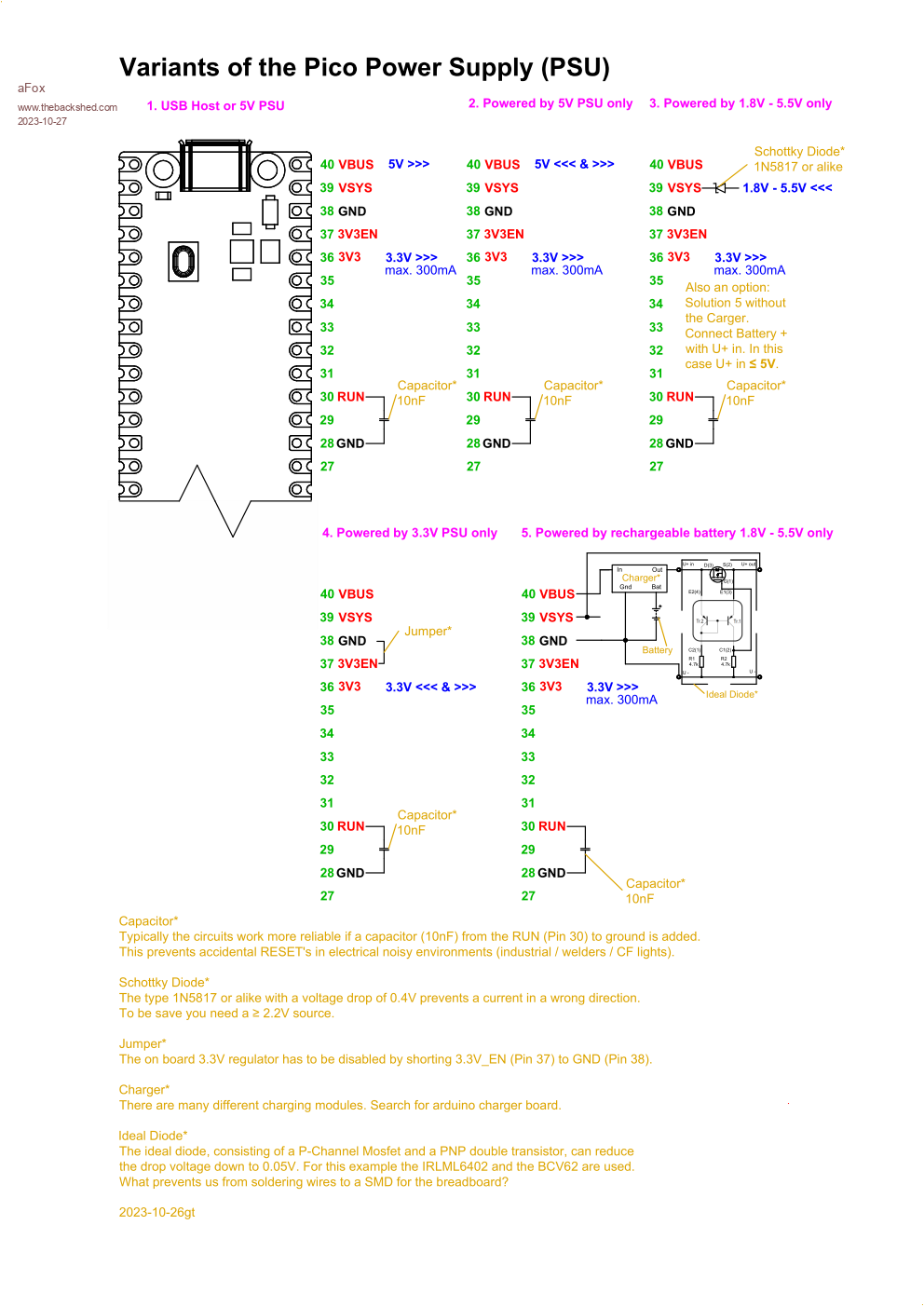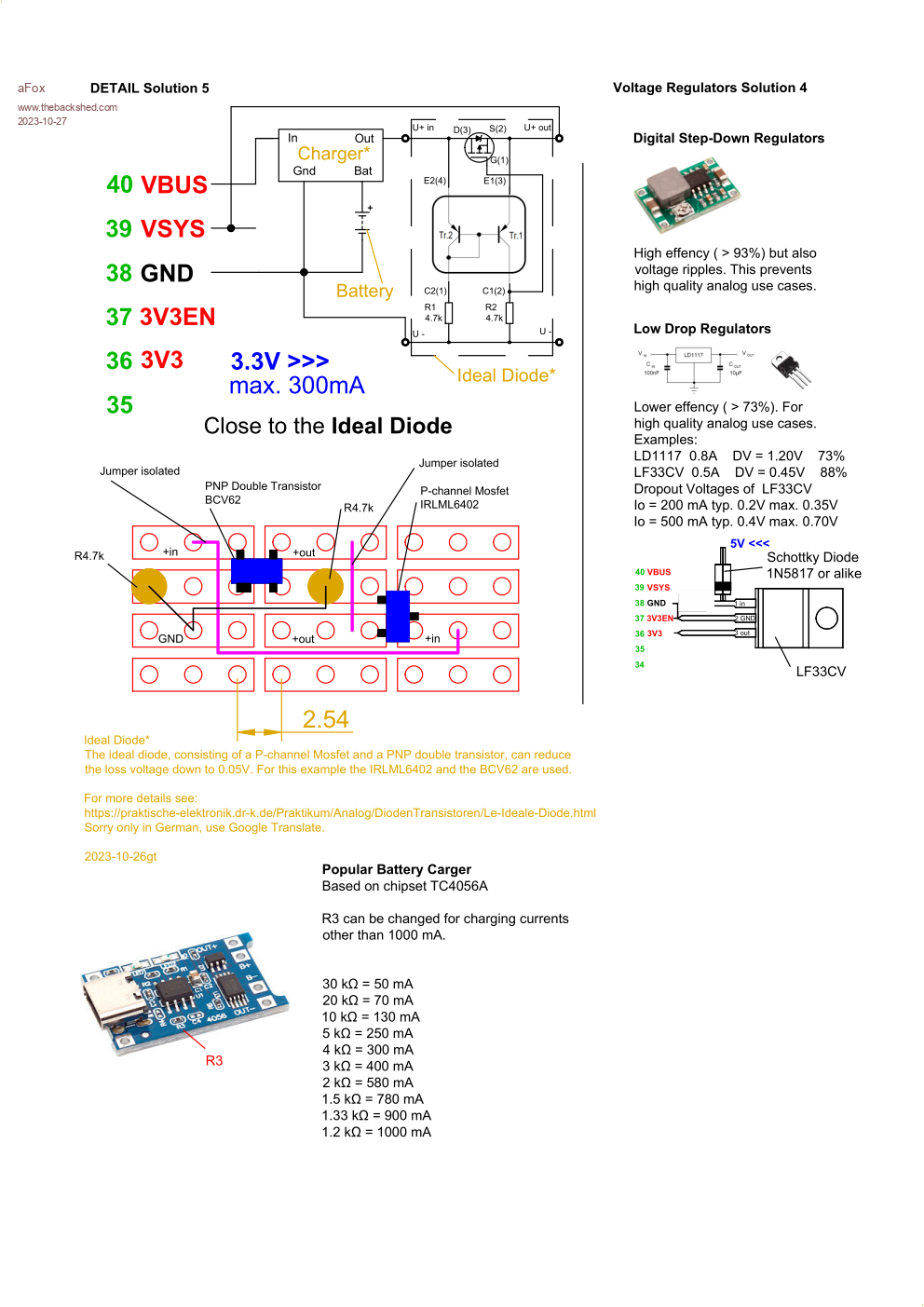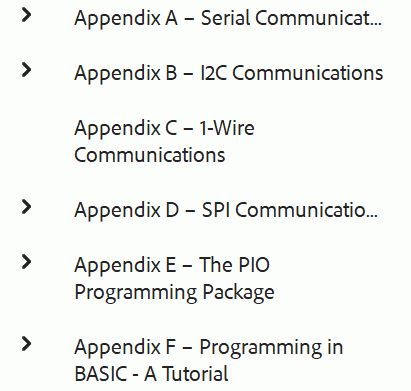
|

|
Forum Index : Microcontroller and PC projects : Pico Power Supply Cheat Sheet
| Author | Message | ||||
| Mixtel90 Guru Joined: 05/10/2019 Location: United KingdomPosts: 6798 |
I'm having you on, Stan. I've not been bitten so far (as far as I know anyway). Mick Zilog Inside! nascom.info for Nascom & Gemini Preliminary MMBasic docs & my PCB designs |
||||
| stanleyella Guru Joined: 25/06/2022 Location: United KingdomPosts: 2129 |
These are handy for vero. £6. 5v & 3.3v These are cheap.. what's the postage though? https://cpc.farnell.com/stmicroelectronics/ld1117v33/v-reg-ldo-3-3v-1117-to-220-3/dp/SC08302 |
||||
| Mixtel90 Guru Joined: 05/10/2019 Location: United KingdomPosts: 6798 |
https://forums.raspberrypi.com//viewtopic.php?t=40601 Paragraph 6 I often get components from Bitsbox because their postage is very reasonable. They also have the LF33. Mick Zilog Inside! nascom.info for Nascom & Gemini Preliminary MMBasic docs & my PCB designs |
||||
| aFox Regular Member Joined: 28/02/2023 Location: GermanyPosts: 76 |
Cheat Sheet Update Many thanks for your help. I have changed the Mosfet part because I found a detailed Ideal Diode description. For more details see: https://praktische-elektronik.dr-k.de/Praktikum/Analog/DiodenTransistoren/Le-Ideale-Diode.html Sorry only in German, use Google Translate. I have not problem to get the suggested parts here in Germany. What is in your country? Comparsion Types: P-channel Mosfet IRLML6402? PNP double transistor BCV62?   Pico Power Supply Cheat Sheet 2023-10-26.zip Any suggestions are welcome! Gregor Edited 2023-10-27 10:21 by aFox |
||||
| aFox Regular Member Joined: 28/02/2023 Location: GermanyPosts: 76 |
I just noticed that the capacitors are missing next to the LF33CV. Practical suggestions? Gregor |
||||
| aFox Regular Member Joined: 28/02/2023 Location: GermanyPosts: 76 |
I think we have to talk also about the Jumper in Solution 4 because if we use the USB port for a program update. Do we get in trouble? Do we have 5V on the 3.3 port (Pin 36)? Gregor |
||||
| amigawizard Regular Member Joined: 15/08/2023 Location: AustraliaPosts: 43 |
" NO ! " Wayne !  ` |
||||
| phil99 Guru Joined: 11/02/2018 Location: AustraliaPosts: 2135 |
Expanding the above answer, the jumper only inhibits the on-board regulator. It does not bypass it. Solution 4 only runs from the external 3.3V supply while the jumper is on. Firmware loading proceeds as normal. |
||||
| Mixtel90 Guru Joined: 05/10/2019 Location: United KingdomPosts: 6798 |
There are hundreds of ways to power a PicoMite (or anything else for that matter). What's being written here is virtually a treatise on simple power supply topology, without the design element. IMHO it's important to understand at least basic electronic theory before you even consider getting a PicoMite, never mind connecting it to any sort of a power supply other than the USB lead. Remember, the idea of the Pico module is to use it for embedded control - it's a component in it's own right and you have to learn how to use it effectively for your own application. The PicoMite manual gives you information on using MMBasic on the PicoMite, it's not intended to teach electronics. It assumes that you know how to connect some sort of power supply, which is fair enough. The Raspberry Pi Pico Datasheet gives information on how to connect and use the Pico itself. The Raspberry Pi RP2040 Datasheet gives you much more detail on the power capabilities of the chip itself. Mick Zilog Inside! nascom.info for Nascom & Gemini Preliminary MMBasic docs & my PCB designs |
||||
| aFox Regular Member Joined: 28/02/2023 Location: GermanyPosts: 76 |
Hi Mick Interesting thoughts! Not more but also not less. It puts the information in the Power Supply chapter into an expanded visual context. There are said to be people who have bought a car or motorcycle without having a driving license. As an incentive to achieve this. On the other hand, if a diploma were required to raise a child, humanity would already be extinct. Learning is the right keyword. The best way to learn this is to accidentally let a component smoke from time to time. With the Pico, the cost is kept within limits. Why not? Do we want to leave everything to Python and C++? The fewer obstacles to obtaining information, the better. I would agree with you if the information collected here in the forum didn't occasionally deviate from or supplement it. I would particularly like to point out the principle of the 'Ideal Diode' presented by Vollout. I had never heard of this principle before, let alone the 'current mirror'. That is certainly true. But especially today you need an early experience of success to get excited about electronics. We need more electronics technicians than ever before. AI will not do everything automatically. Gregor |
||||
| Mixtel90 Guru Joined: 05/10/2019 Location: United KingdomPosts: 6798 |
I said: The answer to that is that the manual (like all the others) is about running MMNasic on a particular platform, not about the platform itself. It gives essential information such as the pinout and basic power supply requirements together with a few examples of how to use the GPIO pins. That's all. It doesn't need anything else. We come up against this frequently. How much do you *need* in the manual vs how much would someone *like to see* in it. Space is limited and time to produce and keep it updated is limited. Your PSU information is great, but IMHO it doesn't belong in a firmware manual about MMBasic. It belongs in a second manual that is specific to the Pico or PicoMite (it's a hardware subject that's relevant to both) or to just the PicoMite if you prefer. In fact, some of it, with different connections obviously, also applies to the Micromite and most of the boards in that family. Do you see what I mean about it being an electronics course? Mick Zilog Inside! nascom.info for Nascom & Gemini Preliminary MMBasic docs & my PCB designs |
||||
| lizby Guru Joined: 17/05/2016 Location: United StatesPosts: 3150 |
Literally, the title page of the manual is: PicoMite, Armmite F4, SensorKits, MMBasic Hardware, Games, etc. on fruitoftheshed |
||||
| Mixtel90 Guru Joined: 05/10/2019 Location: United KingdomPosts: 6798 |
So it should include most of the Raspberry Pi Pico Datasheet too then, as that describes the hardware? Mick Zilog Inside! nascom.info for Nascom & Gemini Preliminary MMBasic docs & my PCB designs |
||||
| JohnS Guru Joined: 18/11/2011 Location: United KingdomPosts: 3802 |
At most just some URLs where to find such things or even LMGTFY :) Otherwise where do you draw the line? I2C, SPI, RS232, 1-wire, Ohm's Law, electrons, quantum physics, ... John |
||||
| Mixtel90 Guru Joined: 05/10/2019 Location: United KingdomPosts: 6798 |
You have to stop somewhere. At some point you reach the stage where the manual contains a lot of information that's only ever read a couple of times and, after that, it's just unnecessary bulk. It's also easy to include info that isn't quite close enough to what the user wants and he/she has to go looking elsewhere anyway. Getting the essentials down is important so that, if the user really needs more info then at least they have a sound basis to work from. It might be an idea to include links to the Raspberry Pi documentation. I think there is also a pdf of a Micropython book for the Pico which has a lot of relevant material. (yes, there is} Mick Zilog Inside! nascom.info for Nascom & Gemini Preliminary MMBasic docs & my PCB designs |
||||
| JohnS Guru Joined: 18/11/2011 Location: United KingdomPosts: 3802 |
That has quite a bit about hardware, such as details on how to solder and resistor colour bands, but I didn't see any detailed discussion of power / Schottky diodes / etc in its 139 pages. (Unsurprisingly. Yes you do have to stop somewhere.) John |
||||
| lizby Guru Joined: 17/05/2016 Location: United StatesPosts: 3150 |
PicoMite Manual:  Ok, no Ohm's Law or quantum physics, but I think this particular cheat sheet on powering the PicoMite would be worthwhile in an Appendix. PicoMite, Armmite F4, SensorKits, MMBasic Hardware, Games, etc. on fruitoftheshed |
||||
| Mixtel90 Guru Joined: 05/10/2019 Location: United KingdomPosts: 6798 |
All those are specific to MMBasic though, they aren't general information (although F is perhaps a bit more general). It's not information you are likely to come across anywhere else. Powering something at 3V3 or 5V0 via diodes, MOSFETs, switching regulators (buck, boost and buck/boost), linear regulators (fixed and variable), batteries and chargers, solar cells etc. is all general electronics. There are thousands of references. There's no need to repeat it simply because two Pico has some power supply components (already documented elsewhere) on it. The manual *does* show w to power the PicoMite, it just doesn't show the many possible variations, which most people with any electronics knowledge will either already know about or will be able to find easily. Then, what do you do about the Pico "clones" that run MMBasic quite happily? The ones with linear regulators instead of switchers. Do you cover those too? If so, which ones? They all have the RP2040. Mick Zilog Inside! nascom.info for Nascom & Gemini Preliminary MMBasic docs & my PCB designs |
||||
| lizby Guru Joined: 17/05/2016 Location: United StatesPosts: 3150 |
It's explicitly a "PicoMite" manual, per the title page--there's no need for the manual to cater to other Pico versions, other than to the extent MMBasic does. I would agree that the cheat sheet at present has become more expansive than necessary. But in any case, others will determine what might or might not be usefully included in the manual. To me, some illustration of the non-USB options for powering the PicoMite would be useful. PicoMite, Armmite F4, SensorKits, MMBasic Hardware, Games, etc. on fruitoftheshed |
||||
| matherp Guru Joined: 11/12/2012 Location: United KingdomPosts: 9122 |
For the avoidance of doubt, I won't be including this in the manual so unless Geoff has other ideas this discussion is moot |
||||